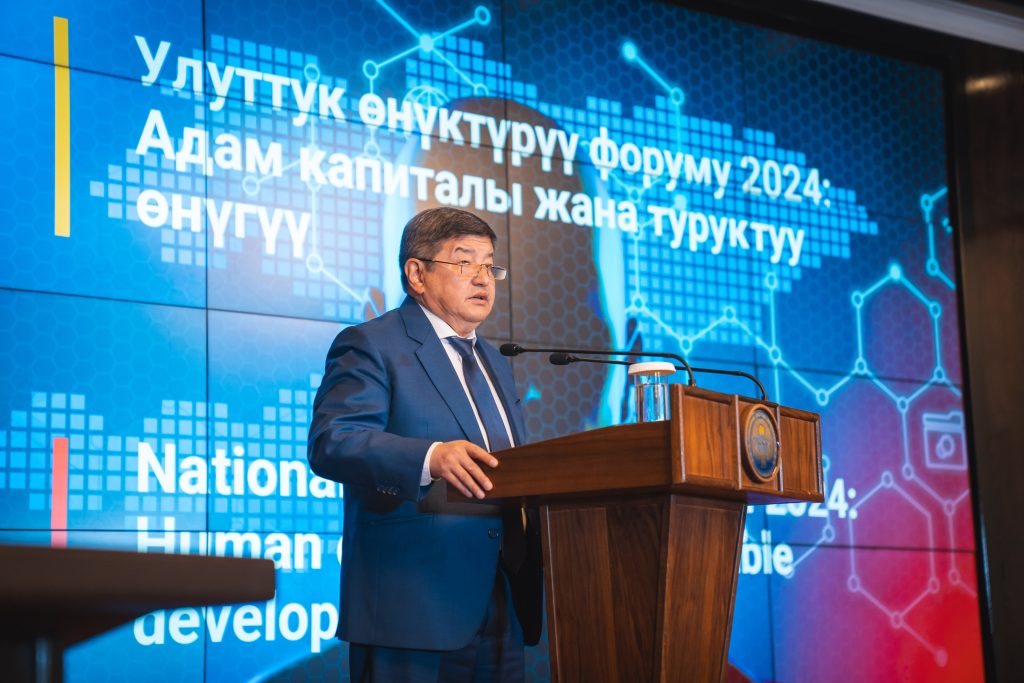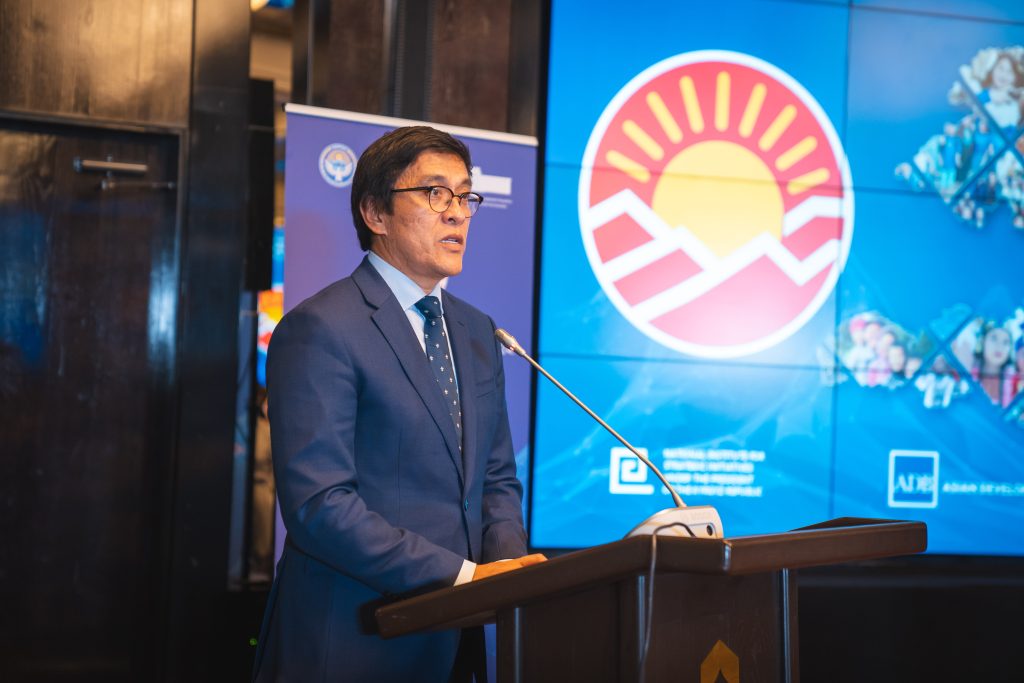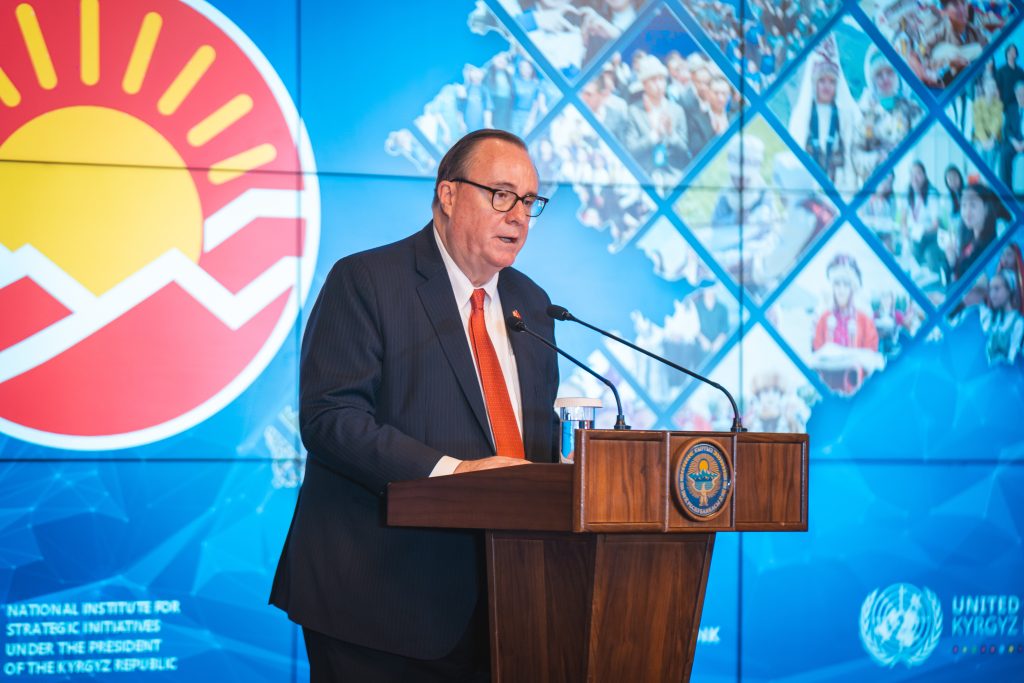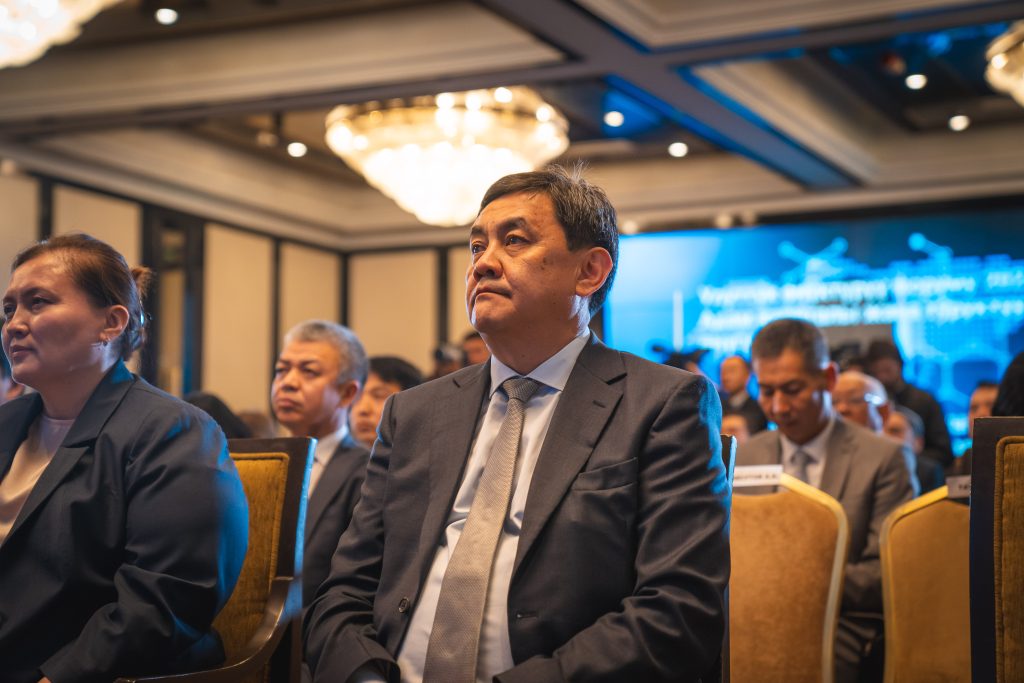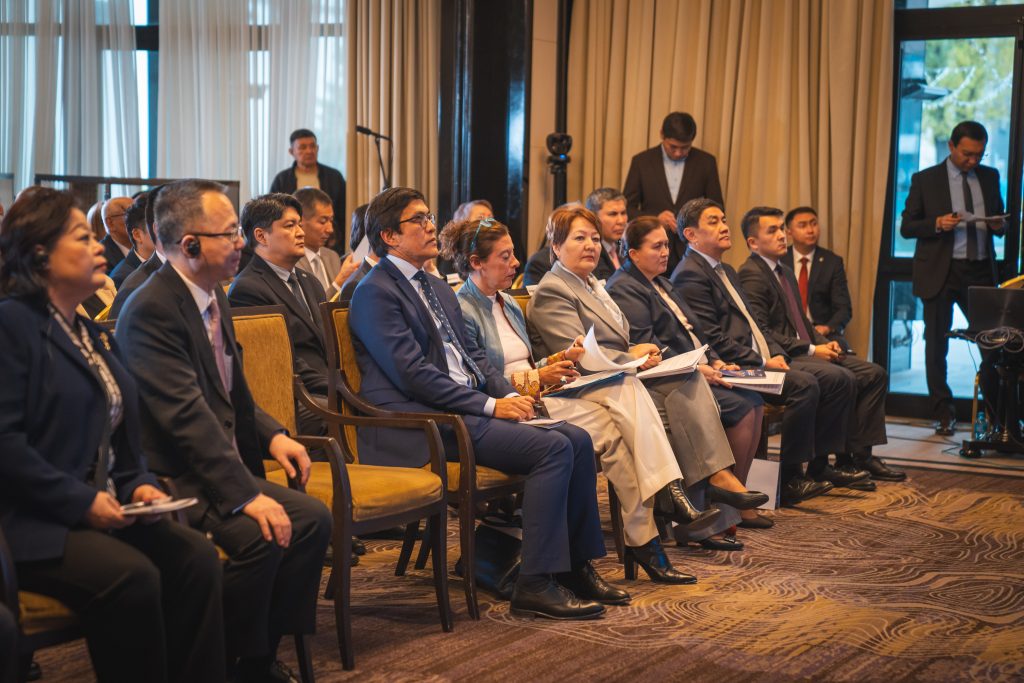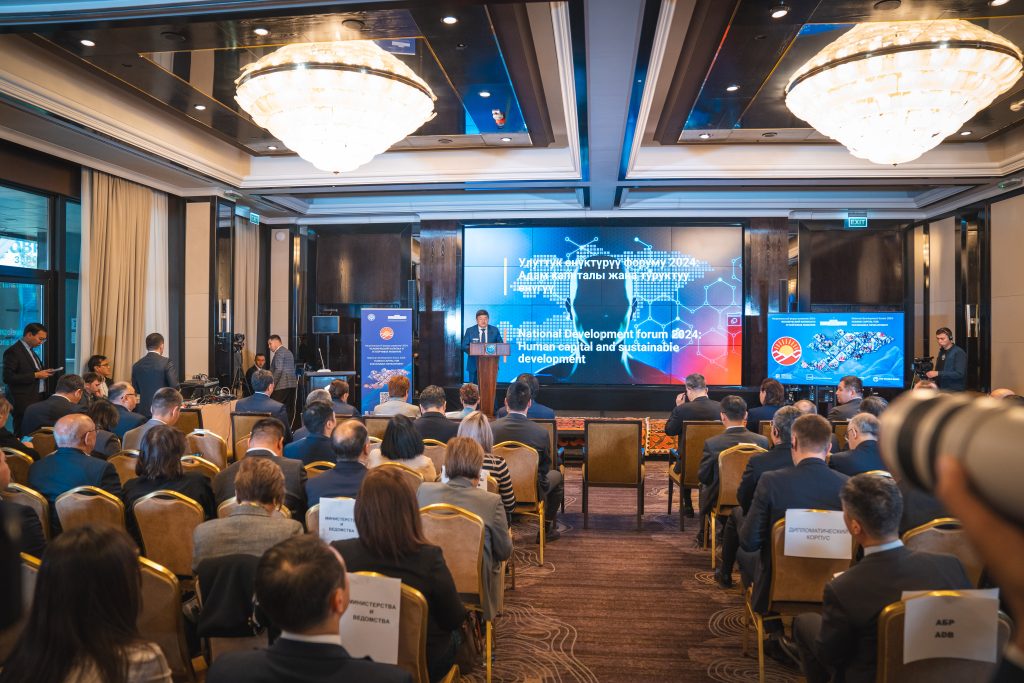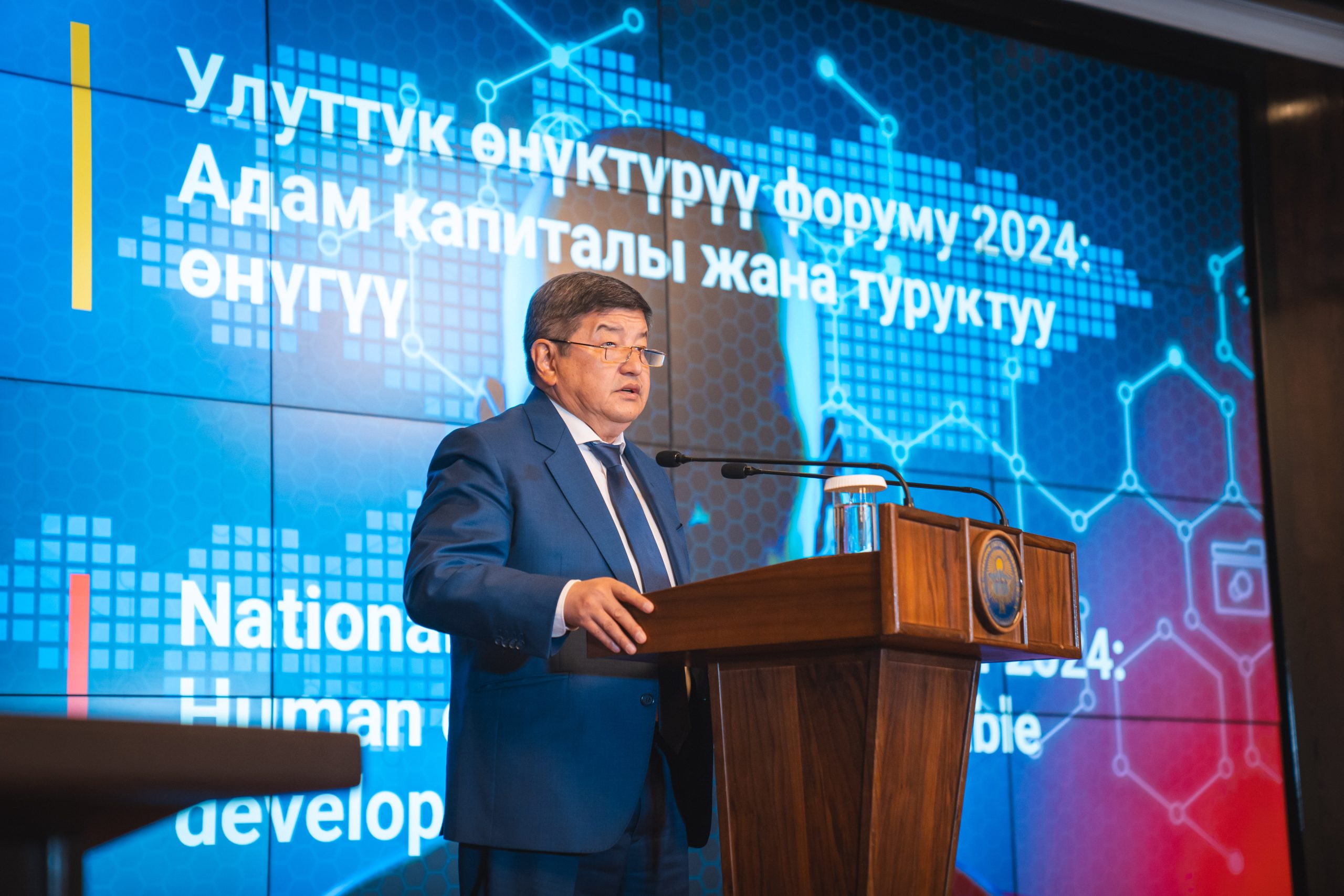Dear Vice President of the Asian Development Bank, Mr. Yingming Yang!
Honorable Ambassadors and the Resident Representative
of the United Nations in Kyrgyzstan, Ms. Antje Grawe!
Distinguished guests from afar and those participating online in the forum!
Television audience!
Dear colleagues and partners!
The topic of this year’s National Development Forum is, no doubt, the most reliable path to our country’s sustainable development. Developing human capital is the heart of our efforts. This development requires not only resources but also a deep sense of responsibility toward our people and future generations.
While other countries may rely on their natural resources—such as oil, gas or mineral wealth—to thrive, we must remember that our single and most vital asset, capable of leading Kyrgyzstan to new heights, is the human capital within our diverse population.
The clear task put forward by our Head of State, Honorable Sadyr Nurgozhoevich Zhaparov, and the primary duty of our Government is to fully unlock the potential of each of our citizens. This includes ensuring access to high-quality education, opportunities to learn new skills, improving health, fostering creativity, expanding productive employment opportunities, and supporting various initiatives.
We believe that investments in education, healthcare, and social security are the most effective investments for building the foundation of a strong and prosperous nation.
Today’s forum serves as an invitation for dialogue among government bodies, the private sector, civil society, and our international partners on how we can build Kyrgyzstan that, under conditions of stability and peace, provides every person with opportunities for a decent life, education, and work.
Dear colleagues!
In just four years, the team led by President Sadyr Zhaparov has brought the Kyrgyz Republic out of a deep crisis and onto a path of stable development—something no internal or external analyst can deny.
The formation of a strong and flourishing Kyrgyzstan is a path paved by our shared belief in our potential, our efforts and our unity. Not only we do look to the future, but we also surpass new milestones, building it every day.
We are currently witnessing the results of our collective efforts. Our current economic policy has strengthened the country’s position: last year, Kyrgyzstan’s GDP exceeded 1.2 trillion soms, and we expect it to reach 1.5 trillion this year. In dollar terms, GDP per capita is around $2,500, which means that over the past four years, GDP has effectively doubled.
The country’s budget has tripled in three years, rising from 247.7 billion soms in 2020 to over 660 billion soms in 2024, as you all know well.
For thirty years, we have been talking about “good governance” and “honest administration,” and now those words are beginning to turn into action. The concept of “effective administration” has transformed from a mere slogan into a fundamental principle of state governance. You can also see the results of our unwavering fight against corruption and organized crime.
I have always repeated that the ideology guiding today’s Kyrgyzstan is based on three principles: the integrity of our state, the unity of our people, and the obligation to pay taxes fully and on time. I remember when we first announced these principles, they were met with skepticism. Now, the situation has changed, and our path is gradually becoming clearer, with a strengthening trust in the government that cannot be overlooked and brings us joy.
I turn to our esteemed international partners!
A balanced monetary policy has been implemented in the country, resulting in a decrease in inflation from 14.7% in 2022 to 7.3% in 2023, and to 3.4% in 2024. The value of the Kyrgyz som has strengthened, and the exchange rate against the US dollar has dropped from 89-90 soms to the current 85 soms.
One of the most promising facts is that in the third quarter of 2024, the growth rate of real gross domestic product was 8.4%, and 9.7% when excluding Kumtor. We are confident that we can maintain this pace next year. Investments in infrastructure, housing, and other capital construction projects are expected to be at least as high as this year, with major industrial facilities, hydropower stations, and railway constructions starting, which will further contribute to this growth.
I would like to emphasize that these plans will be included in the draft state budget for 2025, which will be approved by the Jogorku Kenesh next week. To the members of the Jogorku Kenesh participating in today’s forum, I take this opportunity to express my gratitude for supporting our President’s high-ambition policy for the country’s development and for backing the proposals and projects put forward by the Cabinet of Ministers.
Our people have begun to see the results of the cooperative work of the branches of government, and they continue to demand a unified policy from us.
The significant increase in the state budget has been possible due to the reduction of the shadow economy and improvements in tax regulation. Currently, tax reforms are underway. It is important to note that over the past four years, tax rates for entrepreneurs have not increased, and no new taxes have been introduced, while measures to reduce the shadow economy have been implemented
Dear participants of the National Forum!
Today, we will hear the speeches of the heads of ministries and other government agencies, representatives of international organizations, as well as scientists, activists and entrepreneurs.
I would like to briefly outline the main directions and priorities of state policy in the further development and strengthening of human capital. My colleagues, the Ministers of economy, education, labor, and health, will elaborate on these topics in more detail during the Forum.
When we talk about investing in human capital, we primarily, of course, refer to the field of education!
The President of the country has established the transformation of school education as the cornerstone of all state policy. The programme is literally called “Altyn Kazyk” (“North Star” in Kyrgyz), because providing our children with a solid foundation of knowledge and skills that will allow them to become and remain competitive in a rapidly changing world is the guiding star of all our efforts.
You may remember the previous years when every classroom in the Soviet school had the slogan of Vladimir Ilyich Lenin hanging on the wall: “Learn, learn and learn!” In the past, one could learn and master a certain amount of knowledge that would enable them to be a successful and productive member of society for the rest of their lives. Now, instead of the Leninist slogan in every classroom, we must hang a new motto: “Learn how to learn!“. Not only every schoolchild and student but also every adult must continuously update their knowledge and skills throughout their lives. Schools should teach every child, first and foremost, the skills to constantly gather and critically process information, analyze, and generate new knowledge.
Dear friends!
The most important task today is to awaken our teaching community, to re-engage and motivate them. We will not spare any effort or resources for this purpose. However, I must say right away: a school is certainly not a place of guaranteed employment for the lazy and the backward person. We will ruthlessly eliminate such individuals. The time when a teacher only needed to attend two-week training courses every five years is long gone. We are providing each teacher with a personal laptop so that they can dedicate at least two hours each day to deepening their knowledge and studying the experiences and practices of leading teachers not only from Kyrgyzstan but from around the world.
Today, the entire educational and methodological base of schools is being completely updated, including all textbooks, programmes, and standards. At the same time, we do not have time for delays and adaptation. We cannot afford to experiment, pilot, and test for years. Time has accelerated. Today, the question is being decided about what place each nation will occupy in the global distribution of labor and wealth in the middle of this century and beyond. The future position of our nation in the world, the fate of our entire multinational people, and each family is determined today by the state of our schools.
Many people misunderstand the issue and reduce it all to simply extending 12 years of education. This is not the case at all. We are not talking about mechanically prolonging today’s hopelessly outdated school curriculum and, to be honest, the very low quality of teaching. I repeat once again, schools must change completely today. The same challenge remains in front of our universities. We urgently need to reform school and university programmes by incorporating skills that will be in demand in the future, such as digital literacy, critical thinking and environmental awareness.
Today, Kyrgyzstan is actively investing in early childhood development. We are systematically increasing our efforts to expand access to kindergarten services. Just this year, we raised the share of children in kindergartens from 28% to 35%. Some of our radical measures at the local level should increase this coverage to 40% in the coming months. At the same time, I want to emphasize that the Ministry of Education, in collaboration with international organizations, primarily UNICEF, is currently working to achieve 100% coverage of all six-year-old children with preparatory school courses.
We give priority to early childhood education, healthcare, and nutrition, creating a foundation for long-term learning and health. I will not go into detail about the existing social welfare programmes, but I want to emphasize that we intend to significantly expand the level and scope of social assistance in 2026-2027 provided to children, especially those under three years old.
In the field of vocational and technical education, the government is currently actively reviewing curricula. You know that we have already reduced the duration of most of the courses offered. We are now focused on improving the alignment of skills with labor market demands, taking into account the needs of local businesses and newly established industries. The range of courses at primary vocational colleges is expanding, not only for adolescents but also for the adult population. Today, there is a pressing need for a radical update of their material base. I highly appreciate the results of the ongoing ADB project in this area and call for the scaling up and dissemination of this experience to all vocational colleges.
Currently, the Ministry of Education, in collaboration with the Ministry of Labor, needs to create a modern online platform for lifelong learning, where citizens can take courses for personal and professional growth. We also intend to actively encourage universities and companies to offer subsidized courses, focusing on in-demand skills to build a sustainable workforce.
The Cabinet of Ministers will continue to actively work to bridge the digital divide, especially in rural areas, by improving access to the internet, online government services, and offering digital literacy programmes. We intend to strengthen cooperation with telecommunications companies and non-governmental organizations to expand outreach to low-income groups, particularly youth, women, and ethnic minorities. The Ministry of Health will continue to enhance the level of public health and well-being. As we restore and further improve infrastructure, we must prioritize disease prevention measures, such as regular medical check-ups and health education, to reduce the burden of preventable diseases. In the coming months, there are plans to conduct extensive information campaigns promoting a healthy lifestyle, gradually lowering healthcare costs and increasing the overall productivity of the population. An important aspect here is the discussed project of the national programme for the renovation and construction of 20-25 new regional hospitals with 180, 300, and 500 beds. We will need significant consulting assistance from our traditional international partners here, primarily the World Health Organization, the World Bank and the Asian Development Bank.
Dear friends!
In discussing the development of human capital in the country, we must not, and we do not have the right to leave anyone behind or outside of our work.The Cabinet of Ministers intends to support inclusive participation in the workforce and public life, and to implement policies that promote the participation of women, people with disabilities, and other underrepresented groups in economic activities. We will actively work with civil society organizations representing the interests of these underrepresented groups to ensure the necessary working conditions and improve the legislative framework that facilitates the full participation of all population groups.
The government will continue to actively stimulate innovation and entrepreneurship. Next year, we intend to develop an ecosystem that supports startups and small businesses, as well as women’s and youth entrepreneurship, through access to funding, grants, tax benefits, and incubation programmes. To collaborate with international investors and technology companies to create an innovation hub focused on areas such as green technology and digital finance.
The leadership of the republic sets the task of improving labor mobility and workforce flexibility. To this end, the housing construction programme will be strictly coordinated, especially through the State Mortgage Company. We will implement a policy that allows for the movement of the workforce between different regions and sectors, ensuring that skills match demand. The Ministry of Labor has been tasked with redesigning the job vacancy portal, maintaining strict records of created jobs, significantly increasing the volume of active measures to stimulate and support job creation, and training citizens to fill critically important roles in new industries.
Dear colleagues!
Each of these initiatives represents a concrete step that requires the active involvement of the government, Parliament, the private sector, international partners, and civil society. I hope for your active support and engagement in the implementation of these and other sustainable development programmes.
Dear participants of the Forum!
Today, as Kyrgyzstan enters the second phase of demographic transition, we must not only prepare the working population but also establish the foundations for our youth to acquire skills required in a post-industrial society.
Quality human capital is the foundation of a sustainable future, and its development requires strategic investments in healthcare, education and social protection.
Currently, the Cabinet of Ministers is developing the National Development Programme till 2030. It includes measures to undergo long-term tests and unlock the country’s potential. At the heart of this programme is a healthy, educated, socially protected individual capable of demonstrating their abilities and talents and contributing to the economy.
By 2030, we intend to implement advanced methods of managing state assets, develop a platform for attracting investments, list on global stock exchanges, and double the level of gross domestic product to reach $30 billion. We need to continue economic and social reforms, but these efforts must be collective and success should be shared by all.
The secret to our success lies in perseverance, hard work, and self-belief. We have proven to the whole world that what seems impossible is indeed possible.
We aim to create the necessary conditions for every Kyrgyz citizen to unlock their potential in the context of global competition. This requires significant investment with a strong focus on human capital.
Dear participants of the Forum, we must look further. Our task in the coming years is to develop human capital, which is the foundation of sustainable development and growth.
By 2030, Kyrgyzstan should become a country with an income per capita above average. This is a very ambitious goal, but we can achieve it if we consistently and continuously work on the quality of education, healthcare, and social support. Investments made for each citizen are the foundation upon which the future is built.
According to the World Bank’s classification, Kyrgyzstan is steadily rising in terms of gross domestic product per capita and may transition from its current status of a lower-middle-income country—$1,136—to an upper-middle-income country—$4,465—by 2030. It is important to note that upper-middle-income countries have per capita incomes ranging from $4,466 to $13,845.
I have no doubt that we will definitely achieve the goals set by the President to reach a GDP volume of 30 billion US dollars. I have carefully reviewed the recent report from the World Bank about the dangers of the middle-income trap. Our long-term national objective is for Kyrgyzstan to reach a GDP level of 200 billion US dollars by 2050 and thus join the high-income countries. Achieving this will be much more difficult. The only way is to actively implement a policy of investing in the development of human capital, as well as the policy of the three “I”: first, simply attracting investments; then, mastering injections of foreign technologies; and finally, transitioning to independent development of innovations.
At the same time, esteemed colleagues, we must remember that the level of development of our state is not only assessed by the size of GDP per capita. This is not an end in itself. To comprehensively assess human capital and the development of the country, it is necessary to use indicators that take into account various aspects of citizens’ well-being, their potential, and quality of life, rather than just economic productivity. We are well aware of the UN Human Development Index, which combines three key indicators: life expectancy, education level (mean and expected years of schooling), and income per capita. It provides a more balanced view of development, as it combines economic and social factors.
In addition, there is also the Gender Development Index, the Income Inequality Index (or Gini Coefficient), the Inclusive Growth Index, the Social Progress Index, Healthy Life Expectancy, the Accessibility and Quality of Education Index, the Environmental Index, and the Crisis Resilience Index.
These indicators provide a multifaceted view of the quality of life and potential of society, helping to more accurately identify priorities in the development of human capital and social policy.
Dear participants of the Forum!
Today, Kyrgyzstan is developing on its own path. We are deepening reforms by overcoming all difficulties and challenges of the times.
I would like to emphasize the importance of youth in this process. The future of Kyrgyzstan belongs to the new generations, and we need to create ample opportunities for our children and youth to receive quality education and showcase their talents and abilities.
We are setting ambitious goals to create an ecosystem that enables young people to demonstrate their talents and skills while remaining devoted patriots of their homeland. By building a developed country, we rely on qualities such as hard work and aspiration toward goals. Development is for people, development depends on people, and its outcome is also for people.
Dear ladies and gentlemen!
Kyrgyzstan is on the brink of significant changes, and the efforts of all of us—government, society, business and our international partners—are necessary for these transformations. As is well known, our international partners are providing support to the social sector. Today, I will meet with Mr. Yingming Yang, Vice President of the Asian Development Bank. During this meeting, a Framework Agreement will be signed for financing in the amount of 222 million USD.
The signing and ratification of the Framework Agreement will allow for a reduction in the implementation period of projects by the Asian Development Bank from 284 days to 95 days.
We will carry out similar work with other international partners, such as the Economic Cooperation and Development Fund (EDCF) and the World Bank. It is in the synergy of our common goals that the success of the future lies. Only in this way we can overcome the challenges of our time, unlock our potential, and build a sustainable, prosperous country that will be the support and pride of future generations.
Our true mission is to cultivate citizens who bear responsibility before their homeland with intelligence, integrity and diligence. The labor and knowledge they acquire should be returned to the country and serve as a solid foundation for the development of Kyrgyzstan.
I wish success to the National Forum! I would like to say that I will be watching your discussions live from my office throughout the day.
Thank you for your attention!
